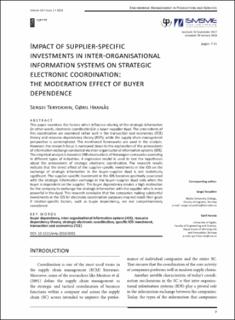| dc.contributor.author | Teryokhin, Sergei | |
| dc.contributor.author | Hannås, Gøril | |
| dc.date.accessioned | 2023-09-28T11:35:59Z | |
| dc.date.available | 2023-09-28T11:35:59Z | |
| dc.date.created | 2018-06-06T11:08:06Z | |
| dc.date.issued | 2018 | |
| dc.identifier.citation | Engineering Management in Production and Services. 2018, 10 (1), 7-21. | en_US |
| dc.identifier.issn | 2543-6597 | |
| dc.identifier.uri | https://hdl.handle.net/11250/3092712 | |
| dc.description.abstract | This paper examines the factors which influence sharing of the strategic information (in other words, electronic coordination) in a buyer–supplier dyad. The antecedents of this coordination are examined rather well in the transaction cost economics (TCE) theory and resource-dependency theory (RDT), while the supply chain management perspective is contemplated. The mentioned frameworks are used in the analysis. However, the research focus is narrowed down to the exploration of the antecedents of information exchange conducted via inter-organisational information systems (IOS). The empirical analysis is based on 198 observations of Norwegian companies operating in different types of industries. A regression model is used to test the hypotheses about the antecedents of strategic electronic coordination. The research results indicate that the direct effect of the supplier-specific investments in the IOS on the exchange of strategic information in the buyer–supplier dyad is not statistically significant. The supplier-specific investment in the IOS becomes positively associated with the strategic information exchange in the buyer–supplier dyad only when the buyer is dependent on the supplier. The buyer dependency creates a high motivation for the company to exchange the strategic information with the supplier who is more powerful in the dyad. This research concludes that the companies making substantial investments in the IOS for electronic coordination purposes may not reach their goals if relation-specific factors, such as buyer dependency, are not comprehensively considered. Keywords: buyer dependency, inter-organisational information system (IOS), resource dependency theory, strategic electronic coordination, specific IOS investment, transaction cost economics (TCE) | en_US |
| dc.language.iso | eng | en_US |
| dc.relation.uri | https://doi.org/10.1515/emj-2018-0001 | |
| dc.rights | Attribution-NonCommercial-NoDerivatives 4.0 Internasjonal | * |
| dc.rights.uri | http://creativecommons.org/licenses/by-nc-nd/4.0/deed.no | * |
| dc.title | Impact of supplier-specific investments in inter-organisational information systems on strategic electronic coordination : the moderation effect of buyer dependence | en_US |
| dc.type | Peer reviewed | en_US |
| dc.type | Journal article | en_US |
| dc.description.version | publishedVersion | en_US |
| dc.source.pagenumber | 7-21 | en_US |
| dc.source.volume | 10 | en_US |
| dc.source.journal | Engineering Management in Production and Services | en_US |
| dc.source.issue | 1 | en_US |
| dc.identifier.doi | 10.1515/emj-2018-0001 | |
| dc.identifier.cristin | 1589373 | |
| cristin.ispublished | true | |
| cristin.fulltext | original | |
| cristin.qualitycode | 1 | |

